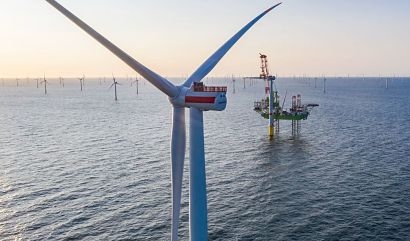
In order to meet the challenge of the transition to a carbon-neutral society by 2050, Belgium needs to look beyond its own production of renewable energy generated domestically or offshore. The import of renewable energy plays an essential role in this respect. The study published today by the Hydrogen Import Coalition concludes that this is both technically and economically feasible.
The thorough feasibility study is the first tangible result of the collaboration between the companies involved, each with its own specific and complementary expertise and experience. This laid the basis for concrete next steps, including pilot projects for the supply of sustainable energy by means of green molecules from countries where wind and solar are available in abundance to Belgian end users, among others.
The climate objective to reduce CO2 emissions in Belgium by 80 percent by 2050 compared to 2005 levels is a major challenge and requires a large-scale switch from fossil fuels to renewable energy. However, in Belgium and Western Europe, there is not enough wind or solar energy, while other regions in the world in fact have solar and wind energy in abundance. In order to achieve a reliable, affordable and sustainable energy system, local production of solar and wind energy will therefore have to be supplemented by the supply of some of the necessary renewable energy from abroad. Molecules can act as energy carriers to efficiently transport green energy through pipelines and ships. Hydrogen, as a carrier of renewable energy, plays an important role in the blend of end-user solutions.
Over a year ago, seven major industrial players and public stakeholders joined forces and expertise to jointly analyse the opportunities for importing green hydrogen into Belgium. The coalition, consisting of DEME, ENGIE, Exmar, Fluxys, Port of Antwerp, Port of Zeebrugge and WaterstofNet, has now completed a large-scale industrial study mapping out the financial, technical and regulatory aspects of the entire hydrogen import chain – from production abroad to delivery via ships and pipelines to Belgium and internal distribution – and providing a basis for the further roll-out to industrial applications.
After thorough analysis of all the elements, the study concludes that importing this form of renewable energy is a necessary and feasible solution to the growing shortage in Western Europe. Various types of hydrogen-derived carriers from a range of supply regions will be able to provide cost-competitive renewable energy and raw materials by 2030-2035. The most promising green energy carriers are ammonia, methanol and synthetic methane. These can be deployed through existing modes of transport – such as pipelines and maritime transport in particular – and growing markets, encouraging a rapid start.
According to the study, this import of renewable energy through green hydrogen carriers will therefore become an essential part of the Belgian energy supply, complementing the sustainable transition based on domestically generated energy. Belgium also has maritime ports and extensive pipeline infrastructure, is linked to the major industrial clusters and has the capacity to meet its own energy needs and those of surrounding countries.
With the completion of the feasibility study, the coalition partners want to take some concrete next steps. This will involve analysis of how to prepare Belgian seaports to receive the hydrogen carriers of the future, seeking maximum synergy to serve the country’s national interests. Specific pilot projects are being set up whereby Belgium can make maximum use of the Flemish expertise and strength in the area of logistics, industry and technology for the development of a sustainable economy and the climate transition in the region and a broader hinterland.
“Hydrogen will play a decisive role in the energy transition and in making our industry sustainable” said Alexander De Croo, Prime Minister of Belgium. “This study provides essential new insights for the further roll-out of a hydrogen economy and the further reduction of CO2 emissions. The next step is to develop a long-term strategy for importing hydrogen.”
Jan Jambon, Prime Minister of the Flemish Government, added that Flanders is ideally positioned to play a pioneering role in the hydrogen economy at a European level and has the energy hubs of Antwerp and Zeebrugge, transportation infrastructure, an extensive network of pipelines to those ports and to Germany, and technology companies operating in it.
For additional information:

